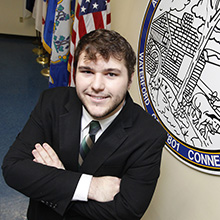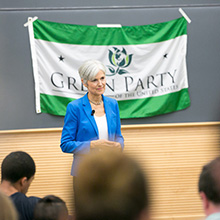Decoding party lines
A Wheaton senior active in hometown politics wants to know what motivates voters to either follow party lines or choose a third-party candidate, so he’s turning to the source to find out.
Joshua Steele Kelly ’17, a political science major from Waterford, Conn., where he is co-chairman of the Waterford Green Party and serves as an alternate on the Zoning Board of Appeals and Conservation Commission, recently released the results of two exit polls he conducted during the 2015 and 2016 elections, local newspaper The Day reported. His full paper on the topic is available on the Waterford Green Party website.
“I first came up with the idea for the surveys in my Introduction to Research Methods course, where we were tasked with conducting research by compiling quantitative data on a subject of our choice,” Kelly said. “As a member of the Green Party, and as someone who was running for office at the time, I was very interested in learning about voting trends.”
He conducted the first survey on Election Day in November 2015 at a precinct in his hometown, posing a list of questions that explored the personal factors that might influence a person to choose a third party candidate. He polled more than 490 voters.
Inspired by those results, and by the traction being made during the 2016 presidential election by Green Party candidate Jill Stein and Libertarian Party candidate Gary Johnson, Kelly decided to extend his study another year. He began an independent study with Assistant Professor of Political Science Brad Bishop and conducted a similar survey in Waterford on November 8, 2016, reaching more than 480 voters.
Survey results showed that even though many voters tended to be biased in favor of either the Democratic or Republican parties, the issues they found most important were an integral part of third party platforms.
Kelly said he hoped his study could help those who are working to promote a multi-party system in the United States.
“I believe these results provide a sort of window into the kinds of voters that third parties are effectively reaching through advertisements and social media, but the study also reveals the kinds of people that have not become as captivated by the idea of multi-party democracy, which may be seen as untapped potential to these groups,” he said.
He also sees the study as useful to voters and hopes it will help citizens realize how closely their viewpoints may align with the Green or Libertarian parties, which in turn could help them overcome “their own insecurities” about voting for a minor party.
The results also could benefit the leadership of the two major parties, Kelly said, highlighting a “disconnect between public opinion and their current platforms.”
Kelly said he hopes to continue his survey during the next several election cycles.
